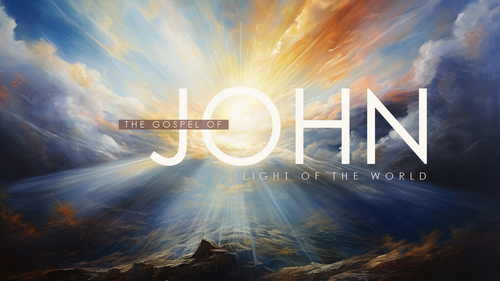John 1:6-13 — the True Light

John 1:6-13 emphasizes the stark contrast between the darkness of a world that rejects its Creator, and the hope found only in embracing Jesus as Lord. In verse 5, the Apostle John had highlighted the preeminence of light over darkness: "the light shines in the darkness, and the darkness did not comprehend it." (John 1:5) This verse establishes a fundamental theme within John's Gospel: the ongoing conflict between spiritual light and spiritual darkness. Light represents the purity and righteousness of God, while darkness symbolizes the sin and brokenness of the world.
The Role of John the Baptist (John 1:6-8)
After 400 years of silence from God's prophetic voice, John the Baptizer enter this conflict to be a witness to Jesus Christ, the true Light of the World. His mission was to prepare the way for the Messiah and to testify about Him so that all might believe through his testimony. As one "sent from God" (John 1:6), his purpose is singular: to "bear witness of the Light, that all through him might believe" (John 1:7). John the Baptizer's role as a witness carries a judicial weight, presenting evidence in the courtroom of this world to prove that Jesus is the true "Word" and "light of God." His message centers on repentance and preparing the way for the Messiah, emphasizing Old Testament prophecies and their fulfillment in Jesus of Nazareth. However, John 1:8 delivers a crucial clarification: "He was not that Light, but was sent to bear witness of that Light." This verse serves as a reminder that John the Baptizer, despite his vital role, remains secondary to Jesus, "whose sandal strap [he is] not worthy to loose" (John 1:27). This was perhaps because even until the time of the Apostle John, there remained followers of John the Baptizer who had not believed on the Lord Jesus.
The True Light (John 1:9-11)
The true Light, as John 1:9 reveals, is Jesus Christ. This verse underscores the universal reach of Jesus' light, emphasizing that He alone can show the way to God. Jesus, as the "true Light," alone offers the light of salvation. This Light, John reminds us, is available to everyone. Tragically, this Light, though present in the world, is met with rejection. John 1:10 states, "He was in the world, and the world was made through Him, and the world did not know Him." This verse highlights the spiritual blindness that permeates a world shrouded in darkness. It is hard to overemphasize the tragedy of this rejection, pointing to humanity's inability to perceive or comprehend the true Light. This rejection intensifies in John 1:11: "He came to His own, and His own did not receive Him." Even Jesus' own people, Israel, fails to recognize Him. This assertion early in the Book foreshadows the opposition that will characterize Jesus' ministry as recorded in John 7-12. This rejection, however, does not diminish the power of the Light or its offer of salvation.
Becoming Children of God (John 1:12-13)
For those who choose to "receive Him" and "believe in His name," a remarkable transformation occurs. John 1:12-13 offers a powerful promise: "But as many as received Him, to them He gave the right to become children of God, to those who believe in His name: who were born, not of blood, nor of the will of the flesh, nor of the will of man, but of God." These verses highlight the transformative power of faith in Jesus. It is through belief, not human effort or lineage, that individuals become children of God. The idea of regeneration that results from receiving Christ is central to the Book's message. Becoming a child of God is not a passive event but requires a conscious decision to embrace Jesus as Lord and receive the gift of new life found only in Him.
This passage offers a powerful call to embrace the Light of the World, Jesus Christ. It reminds us that true life is found only in Him, and challenges us to share His light with a world in desperate need of salvation.
The Role of John the Baptist (John 1:6-8)
After 400 years of silence from God's prophetic voice, John the Baptizer enter this conflict to be a witness to Jesus Christ, the true Light of the World. His mission was to prepare the way for the Messiah and to testify about Him so that all might believe through his testimony. As one "sent from God" (John 1:6), his purpose is singular: to "bear witness of the Light, that all through him might believe" (John 1:7). John the Baptizer's role as a witness carries a judicial weight, presenting evidence in the courtroom of this world to prove that Jesus is the true "Word" and "light of God." His message centers on repentance and preparing the way for the Messiah, emphasizing Old Testament prophecies and their fulfillment in Jesus of Nazareth. However, John 1:8 delivers a crucial clarification: "He was not that Light, but was sent to bear witness of that Light." This verse serves as a reminder that John the Baptizer, despite his vital role, remains secondary to Jesus, "whose sandal strap [he is] not worthy to loose" (John 1:27). This was perhaps because even until the time of the Apostle John, there remained followers of John the Baptizer who had not believed on the Lord Jesus.
The True Light (John 1:9-11)
The true Light, as John 1:9 reveals, is Jesus Christ. This verse underscores the universal reach of Jesus' light, emphasizing that He alone can show the way to God. Jesus, as the "true Light," alone offers the light of salvation. This Light, John reminds us, is available to everyone. Tragically, this Light, though present in the world, is met with rejection. John 1:10 states, "He was in the world, and the world was made through Him, and the world did not know Him." This verse highlights the spiritual blindness that permeates a world shrouded in darkness. It is hard to overemphasize the tragedy of this rejection, pointing to humanity's inability to perceive or comprehend the true Light. This rejection intensifies in John 1:11: "He came to His own, and His own did not receive Him." Even Jesus' own people, Israel, fails to recognize Him. This assertion early in the Book foreshadows the opposition that will characterize Jesus' ministry as recorded in John 7-12. This rejection, however, does not diminish the power of the Light or its offer of salvation.
Becoming Children of God (John 1:12-13)
For those who choose to "receive Him" and "believe in His name," a remarkable transformation occurs. John 1:12-13 offers a powerful promise: "But as many as received Him, to them He gave the right to become children of God, to those who believe in His name: who were born, not of blood, nor of the will of the flesh, nor of the will of man, but of God." These verses highlight the transformative power of faith in Jesus. It is through belief, not human effort or lineage, that individuals become children of God. The idea of regeneration that results from receiving Christ is central to the Book's message. Becoming a child of God is not a passive event but requires a conscious decision to embrace Jesus as Lord and receive the gift of new life found only in Him.
This passage offers a powerful call to embrace the Light of the World, Jesus Christ. It reminds us that true life is found only in Him, and challenges us to share His light with a world in desperate need of salvation.
Posted in Gospel of John
Recent
Habakkuk 2:4b — The Just Shall Live By Faith
February 20th, 2026
Habakkuk 1:12–2:1— Appealing to the Throne of God
February 13th, 2026
Habakkuk: Trusting God in Troubled Times
February 6th, 2026
John 20:18–31 — Believing is Seeing
January 16th, 2026
John 20:1–17 — Love Turns Grief into a Mission
January 10th, 2026
Archive
2026
2025
October
2024
February
March
April
May
July
October
November
December
Advent 2024 Devotion: December 2Advent 2024 Devotion: December 3Advent 2024 Devotion: December 4Advent 2024 Devotion: December 5Advent 2024 Devotion: December 6John 3:16-21 — For God So Loved the WordAdvent 2024 Devotion: December 7Advent 2024 Devotion: December 8Advent 2024 Devotion: December 9Advent 2024 Devotion: December 10Advent 2024 Devotion: December 11Advent 2024 Devotion: December 12Advent 2024 Devotion: December 13Advent 2024 Devotion: December 14Advent 2024 Devotion: December 15Advent 2024 Devotion: December 16Advent 2024 Devotion: December 17Advent 2024 Devotion: December 18Advent 2024 Devotion: December 19Advent 2024 Devotion: December 20Advent 2024 Devotion: December 21Advent 2024 Devotion: December 22Advent 2024 Devotion: December 23Advent 2024 Devotion: December 24Advent 2024 Devotion: December 25
2023
January
February
March
April
May
